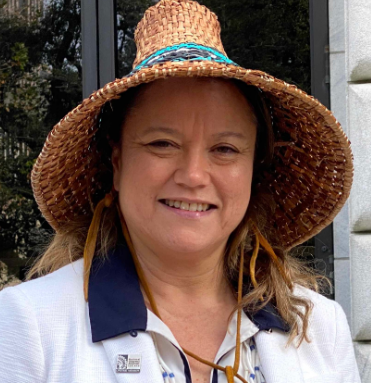Guest Opinion. As we face the unprecedented climate crisis, Indigenous leadership is not merely beneficial; it is indispensable. Indigenous peoples have safeguarded and stewarded our planet’s natural resources for generations, guided by profound respect for the Earth and a duty to protect future generations. Now, more than ever, the world needs the wisdom, resilience, and stewardship that Indigenous leaders uniquely bring. Our survival in this rapidly changing world may well depend on it.

Today, we stand at a pivotal moment—a day of reckoning as prophesied by our ancestors. This moment calls for collective action, one that requires the full and effective participation of Indigenous peoples globally. Our trajectory is clear: humanity cannot sustain itself without Indigenous voices being central in shaping our shared future. This isn’t just about Indigenous survival; it’s about human survival. Indigenous peoples are natural allies in the fight for a sustainable planet, and history has proven the value of our time-tested relationship with nature.
President Biden’s recent national apology brought into public light a truth that had been hidden, forgotten, or conveniently erased for generations. He named an “ugly truth” that many found “too shameful to acknowledge”—one that chronicles the marginalization, exploitation, and attempted erasure of Indigenous peoples across centuries. This apology marked an important step toward national accountability, but it is not the final word. Recognition alone, while necessary, is insufficient to repair the extensive and lasting harm that Indigenous communities have endured.
For Indigenous nations to truly engage in the climate crisis, to bring our leadership to the forefront, and to engage as equals in decisions impacting our communities and the planet, we need more than apologies. We need political equity. This means fully implementing the United Nations Declaration on the Rights of Indigenous Peoples (UNDRIP) and, specifically, honoring the principle of Free, Prior, and Informed Consent. Indigenous peoples must have the power and the right to say “yes” or “no” to decisions that affect our lands, resources, and communities.
Free, Prior, and Informed Consent (FPIC) is a safeguard for Indigenous rights and sovereignty, ensuring that our participation is not only welcomed but respected on equal terms. It places Indigenous communities at the decision-making table—not as guests but as partners. This is political equity in action. Without it, our participation remains conditional, our voices subdued, and our leadership constrained by limitations imposed from outside.
As we confront the dual crises of climate change and social injustice, we must reimagine a world where Indigenous leadership is integral and respected. We must rise to this moment of reckoning, remembering that our ancestors envisioned a future in which Indigenous peoples and all of humanity could thrive together. Today, that future rests on our willingness to embrace and implement meaningful political equity and to honor the wisdom of Indigenous leadership, not merely as stewards of the land but as equal architects of our shared destiny.
But our path forward doesn’t rest solely on political institutions or policy. We each have an inherent responsibility to exercise our voice, to be active participants in shaping the future. This means registering to vote, showing up in every election, and exercising our right to be heard. Voting is an act of sovereignty, a powerful expression of our agency and our stake in the policies that shape our communities and our land. In honoring our ancestors and the lands we have occupied since time immemorial, we must hold true to our civic responsibility.
The stakes are high, but together we can set a new path—one that honors tribal sovereignty, prioritizes ecological stewardship, and ensures that the rights of Indigenous peoples are not merely acknowledged but actively upheld. This is the path forward, and it is a journey we must undertake with purpose, equity, unity, and the commitment to engage as voters. Our future depends on it, as does the enduring legacy of those who came before us and the hopes and dreams of those precious generations yet to be born.
Fawn Sharp, an enviromental expert, is the former president of the National Congress of American Indians, the oldest, largest and most representative American Indian and Alaska Native tribal government organization in the country. Additionally, she served five terms as president of the Quinault Indian Nation in Taholah, Washington.
More Stories Like This
The SAVE America Act Threatens Native Voting Rights — We Must Fight BackThe Presidential Election of 1789
Cherokee Nation: Telling the Full Story During Black History Month
Jesse Jackson Changed Politics for the Better
Native News Online at 15: Humble Beginnings, Unwavering Mission
Help us defend tribal sovereignty.
At Native News Online, our mission is rooted in telling the stories that strengthen sovereignty and uplift Indigenous voices — not just at year’s end, but every single day.
Because of your generosity last year, we were able to keep our reporters on the ground in tribal communities, at national gatherings and in the halls of Congress — covering the issues that matter most to Indian Country: sovereignty, culture, education, health and economic opportunity.
That support sustained us through a tough year in 2025. Now, as we look to the year ahead, we need your help right now to ensure warrior journalism remains strong — reporting that defends tribal sovereignty, amplifies Native truth, and holds power accountable.
 The stakes couldn't be higher. Your support keeps Native voices heard, Native stories told and Native sovereignty defended.
The stakes couldn't be higher. Your support keeps Native voices heard, Native stories told and Native sovereignty defended.
Stand with Warrior Journalism today.
Levi Rickert (Potawatomi), Editor & Publisher
